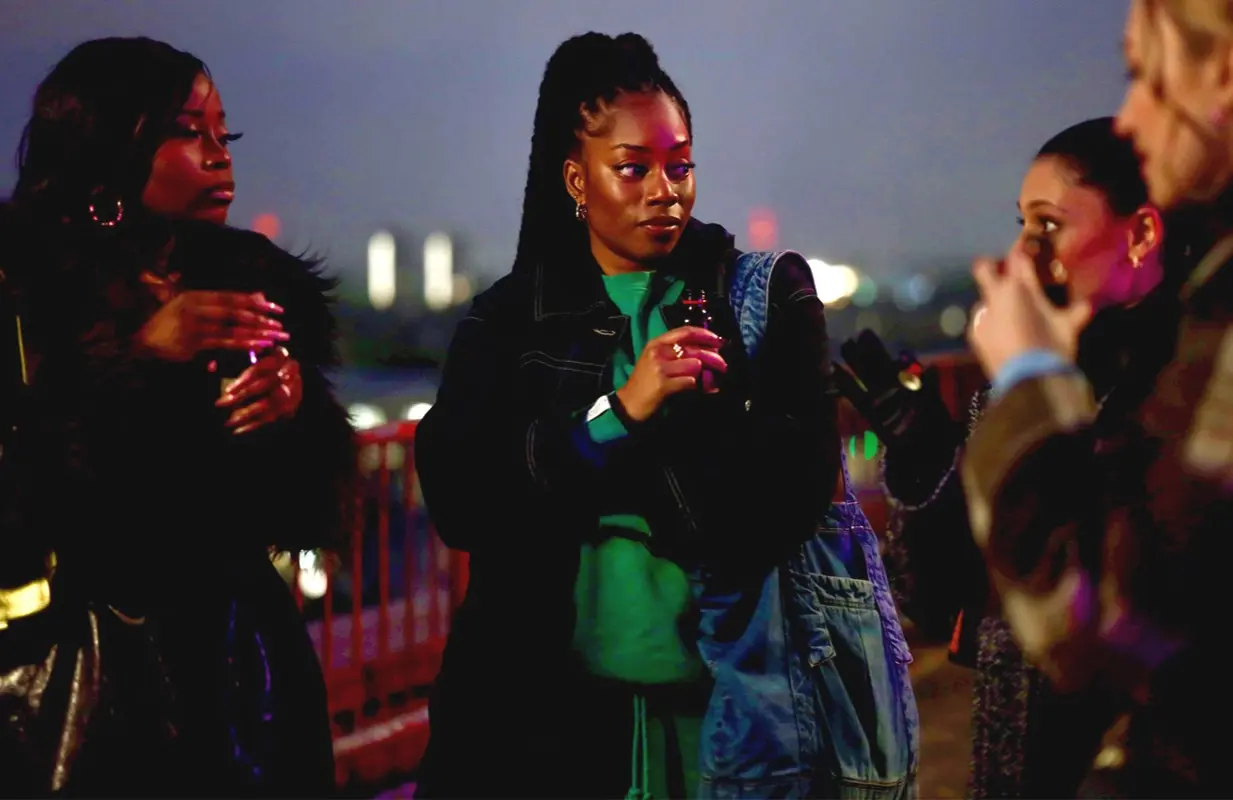Hulu's Queenie Is a Treat for Fans of Chaotic Coming-of-Age Stories
-
 Bella and Dionne Brown in Queenie (Photo: Latoya Okuneye/Lionsgate)
Bella and Dionne Brown in Queenie (Photo: Latoya Okuneye/Lionsgate)Book readers who are pessimistic about TV adaptations have nothing to fear from Hulu’s adaptation of Queenie. The British series, based on the novel of the same name by Candice Carty-Williams, tells the tale of South London Gen Z-er and budding journalist Queenie Jenkins (Dionne Brown) as she deals with her love life and trauma, and a tendency to self-sabotage.
Queenie is a smart, funny series that offers a brilliant commentary on love and friendship. Carty-Williams, who also serves as showrunner and writer, brings a fresh vision to the table that feels quietly revolutionary. The awkward Black girl experience is portrayed so genuinely — it’s sexy and heartwarming, but with a brimming tension under the sex comedy, which builds quickly.
The show introduces us to Queenie during a gynecological examination as she muses about her different causes for worry: the possible loss of her coil, a failing relationship, and an undetected pregnancy. Her aunt Maggie (Michelle Greenridge), who comes to pick her up from the gynecologist’s office, is coldly suspicious about the situation, which later turns out to be a miscarriage. We catch a glimpse into Queenie’s home life with her boyfriend Tom (Jon Pointing). Things between them have been deteriorating for a while, so they decide to go on a break. Thus begins a difficult and painful journey through Queenie’s unfortunate choices in men.
After her "break” from her boyfriend (which everyone, including Queenie on some level, knows is a breakup), Queenie spirals into a breakdown — a notably unsanitized one, including a forceful depiction of how she uses sex as both consolation and as a racialized and gendered form of self-injury. She internalizes her breakup with Tom, assuming full responsibility for their failed relationship, as though there is something inherently wrong and broken with her.
Queenie then falls into what her friend Kyazike (Bellah) calls a “quarter-life crisis,” but it’s really just discovering that her life isn’t what she imagined it would be and she’s not sure how to deal with it. A large part of the season focuses on her attempts to cope with her deep-set emotional pain through self-punishment and abuse. Her string of lovers includes a Pakistani Muslim BMW driver who wants to experience the “forbidden fruit” of sex with a Black woman; a sex addict she meets at a party who gives her internal bruising; and a neo-Nazi encountered on a dating site, also interested in fetishizing her.
Her friends, whom she christens “the Corgis” in their group chat (because she’s the "queen"), are beside her throughout her spiral and at work, where Queenie is constantly interrupting coworker Darcy’s (Tilly Keeper) productivity to talk about her own problems. By the finale, Queenie’s need for attention is made evident through interactions with her romantic partners, friends, family, and coworkers.
There’s really nothing new about any of the scenarios or storylines, but Williams makes it feel fresh and tinged with insightful emotional observation. Queenie is a welcome arrival, as there are so few shows centered on Black women, especially ones in a British setting that take on systemic problems like racism and mental illness.
Despite the relatively low stakes they’re dealing with, the characters still feel like real Gen Z adults. The newsroom setting is entertaining and adds a hearty dose of classic workplace culture. Along with Kyazike, who shines as a fearless, no-nonsense best friend, there are promising secondary characters like Frank (Samuel Adewunmi), Queenie’s friend who’s secretly in love with her.
The events that take place in “The Nightmare Before Christmas” foreshadow how much more intense the show gets — the dinner with her family reminds her of her childhood and triggers her to make more mistakes. Even without knowing the source material, it’s instantly clear that the relationship between Tom and Queenie is not as rosy as she thinks. Each character’s home accurately reflects the lives of middle class Londoners and the directors excel at using blocking and framing to create these chillingly precise compositions. (A prime example is during the night club scene in “Clean Break Queenie” that showcases the gentrification of London clubs.)
The friends-to-lovers dynamic between Queenie and Frank is the most promising, but the execution of the love triangle between Queenie, Tom, and Frank leaves much to be desired. Fortunately, Queenie accepts a helping hand and begins her journey towards healing old wounds and developing more productive coping mechanisms. There’s definitely potential for another season.
Though it struggles to find its footing early on, Queenie is a treat for fans of chaotic coming-of-age drama. The cast is uniformly excellent; as the lead, Dionne Brown masterfully portrays Queenie's gradual unraveling and outbursts. The series underscores the importance of a good support system, reminding viewers that even if the situation seems hopeless, the protagonists and the creators of the show are intent on changing things for the better.
Queenie premieres June 7 on Hulu. Join the discussion about the show in our forums.
Victoria Goldiee is a freelance culture and lifestyle writer with a penchant for underrepresented stories.
TOPICS: Queenie, Hulu, Candice Carty-Williams